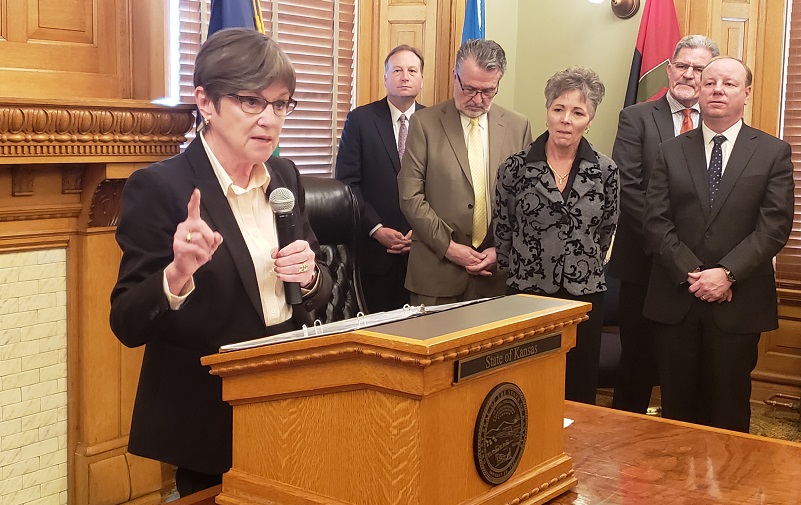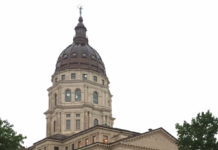The Farm Bureau’s health benefit plan was politically precarious for Democratic Gov. Laura Kelly.
Sign the bill and risk alienating parts of her base that thought the Farm Bureau health plan – exempt from federal and state regulations – was “junk insurance.”
Veto the bill and go to battle with a Legislature that just might have had an enough votes for a veto override. A veto also risked angering a politically potent group that didn’t take sides against her in last fall’s governor race.
Kelly walked a safer path on Friday, letting the bill become law without her signature – a move that potentially could swing her support for Medicaid expansion, observers said.
“It’s a smart political move for her,” said one lobbyist familiar with the issue. “She can show that she can look past some of the partisanship that can happen here. It shows a good-faith effort that she’s willing to play ball here.”
Another Republican source said that Kelly had little choice but to let the Farm Bureau health benefit become law to avoid a showdown with the Legislature. The source, however, was skeptical of whether it would yield a political advantage.
“She played it right,” the source said. “She didn’t like the bill. It’s against what she stands for. But if she would have vetoed it, then we would have overridden it and that’s not good for her either.
“It would have been awful for her in western Kansas to veto that bill and she knew that.”
But the stakes are bigger than just political goodwill.
The governor’s decision may win her support that she needs to get around a Senate that hasn’t been willing to budge on expansion and score the biggest victory of the legislative session.
“No matter how you look at it, a whole lot of political calculation went into this as much if not more than policy,” said one Democratic source.
It’s been argued that Medicaid expansion coupled with the Farm Bureau health plan could potentially provide better and more affordable coverage for separate sectors of the population.
The governor said she had “serious reservations” about the Farm Bureau bill, saying it’s “fundamentally wrong” to deny someone coverage for pre-existing conditions and because it had only been implemented in two other states.
“I believe the potential risks of this legislation can be mitigated if they are coupled with a stable, secure, proven healthcare option: Medicaid expansion,” Kelly said in explaining her decision in allowing the bill to become law.
“I challenge legislators to join me in this good-faith effort, meet me halfway, and enact Medicaid expansion before the 2019 legislative session adjourns,” she said.
Within a half hour of the governor’s statement, the Farm Bureau sent out a statement with its own particular language that some observers believed pointed toward Medicaid expansion.
“KFB urged legislators – especially legislative leaders – to act decisively when the annual wrap up session begins May 1.”
What’s significant about May 1?
It’s the day the Senate is set to take up Minority Leader Anthony Hensley’s motion to pull the Medicaid expansion out of committee. The Senate needs 24 votes to get the bill out of committee and 27 to force a vote.
Farm Bureau President Rich Felts also made this statement that some thought alluded to Medicaid expansion.
“Gov. Kelly made a personally difficult choice in the spirit of compromise,” Felts said in a statement.
“By refusing to succumb to political obstructionism, she has paved the way for lawmakers to advance a comprehensive healthcare solution that will benefit our entire state.”
While the Farm Bureau is not expected to lobby for Medicaid expansion, it is anticipated that it might quietly persuade several rural Republican lawmakers to back the procedural moves needed to force a debate on the issue, sources said.
The chief of staff for the House minority leader sent an email on Friday to Democratic House members indicating that the Farm Bureau would back Medicaid expansion.
“As you know, the governor is letting the Farm Bureau bill become law today without her signature,” according to the email obtained by the Sunflower State Journal. “The Farm Bureau has agreed to help get Medicaid expansion passed in 2019.”
The email added that the governor would send out a news release followed by one from the Farm Bureau “encouraging expansion.”
Ryan Flickner, the Farm Bureau’s senior director of public policy, said the Farm Bureau is not supporting Medicaid expansion.
“The American Farm Bureau Policy Book unequivocally does not support the expansion of Medicaid,” he said.
In talking points about the governor’s decision attached to the email, Medicaid expansion was one of the themes.
“Had the governor vetoed (the Farm bureau bill), the conversation about Medicaid expansion would have ended and been consumed by a divisive veto override attempt,” according to the talking points sent to Democratic lawmakers.
“It would have not only shifted the focus of the public debate, it would have likely fractured the bipartisan expansion coalition, which is filled with supporters” of the Farm Bureau bill.
“The governor’s action avoids a bitter political fight and instead unites a bipartisan coalition together around our shared goal of Medicaid expansion.”
Meanwhile, there are political efforts are underway to build pressure on the Senate in advance of the May 1 vote.
Kansas Appleseed, a nonprofit group that advocates for the less-affluent, plans to go door to door Saturday in the districts of Senate President Susan Wagle and Senate Majority Leader Jim Denning urging passage of Medicaid expansion.
Democratic state Sen. Barbara Bollier said she thought the governor’s decision was less about taking the politically “safe” route than it was about trying to lead the state.
“I don’t know that’s her motivation,” Bollier said. “Governing is different than legislating. I think Laura is governing. Her motivation is this how you govern: You work with people and you can agree to disagree.”
















